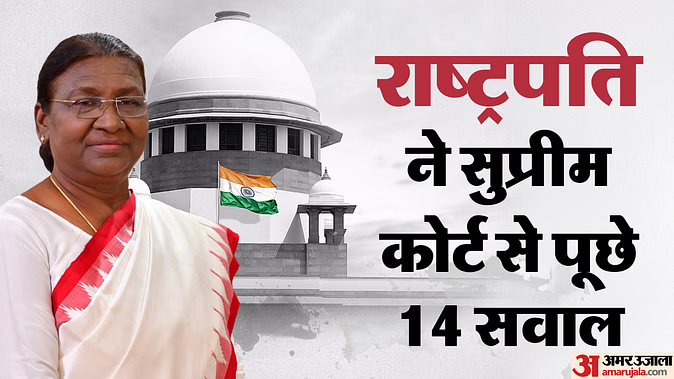President Droupadi Murmu Questions Supreme Court’s Ruling on Deadline for Bill Clearance, Cites Constitutional Concerns
In a significant development, President Droupadi Murmu has raised serious questions about the recent Supreme Court ruling that mandates a specific deadline for the President and Governors to take decisions on bills passed by state legislatures. The President has cited constitutional concerns, pointing out that such provisions are not explicitly mentioned in the Indian Constitution.
This move follows Vice President Jagdeep Dhankhar’s earlier objections to the Supreme Court’s stance, indicating growing unease among constitutional authorities regarding judicial overreach in matters involving executive discretion.
Backdrop: Tamil Nadu Government vs Governor Case
The controversy stems from the Supreme Court’s verdict dated April 8, 2025, in the high-profile case of Tamil Nadu Government vs Governor. In that judgment, the apex court held that Governors and the President must make a decision on pending state bills within a specified timeframe. The court declared that undue delays in granting assent violate constitutional principles and hinder the legislative process.
Specifically, the court noted that:
- The Governor does not possess veto powers and must act within a reasonable period.
- The President must decide on a bill referred under Article 201 within three months, and in the case of delays, must provide valid reasons to the concerned state government.
- If a bill is returned to the state assembly and is re-passed, the President is constitutionally obligated to take a final decision.
- The decision of the Governor or President under Articles 200 and 201 is subject to judicial review, particularly if it contradicts the advice of the Council of Ministers.
- The Supreme Court may exercise its power under Article 201 and Article 142 to ensure constitutional compliance and judicial accountability.
President Raises Constitutional Queries
In a rare and bold move, President Droupadi Murmu has posed 14 specific questions to the Supreme Court, challenging the constitutional basis of its ruling. Her objections revolve around the separation of powers, judicial limitations, and the defined roles of constitutional functionaries.
The 14 Questions Raised by President Murmu:
- What options are available to a Governor under Article 200 when a bill is presented to him/her?
- Is the Governor bound to follow the advice of the Council of Ministers while exercising these options?
- Can the Governor’s decision under Article 200 be subjected to judicial review?
- Does Article 361 provide complete immunity to the Governor’s decisions under Article 200 from judicial scrutiny?
- Can courts impose a time limit on decisions made by the Governor when the Constitution itself is silent on such deadlines?
- Is a decision taken by the President under Article 201 open to judicial review?
- Can courts impose a timeline for the President to act on a bill under Article 201?
- If a Governor reserves a bill for the President’s consideration, should the Governor first seek the Supreme Court’s advisory opinion under Article 143?
- Can courts intervene in the decisions of the Governor or President under Articles 200 and 201 before such decisions are officially enacted?
- Does Article 142 allow the Supreme Court to modify or reinterpret the constitutional powers assigned to the President and Governor?
- Is it possible for a state government to enact a law without the Governor’s approval under Article 200?
- Can a smaller bench of the Supreme Court decide on cases requiring constitutional interpretation without referring them to a five-judge constitutional bench as per Article 145(3)?
- Can the Supreme Court issue directions or rulings that conflict with the Constitution or existing statutory laws?
- Does Article 131 of the Constitution make the Supreme Court the sole authority to adjudicate disputes between the Centre and the states?
Implications and Reactions
The President’s intervention is unprecedented in recent constitutional history and reflects a growing tension between the judiciary and the executive over the interpretation of constitutional roles and responsibilities. Legal experts believe that these questions may lead to a wider constitutional debate and could potentially result in a larger bench being constituted to re-examine the scope of Articles 200 and 201, and the limits of judicial intervention.
While the Supreme Court’s intention was to prevent misuse of gubernatorial powers by enforcing timely decisions, critics argue that imposing deadlines where the Constitution is silent might blur the lines between the judiciary and the executive. The principle of separation of powers is at the heart of this debate.
The coming weeks may see intense legal and political discourse as the Supreme Court considers the constitutional concerns raised by the President. This situation could lead to a significant constitutional clarification or even a redefinition of the balance of power between India’s key institutions.
